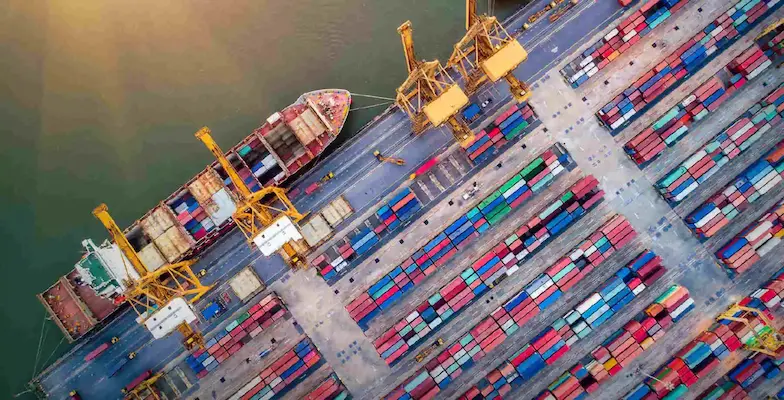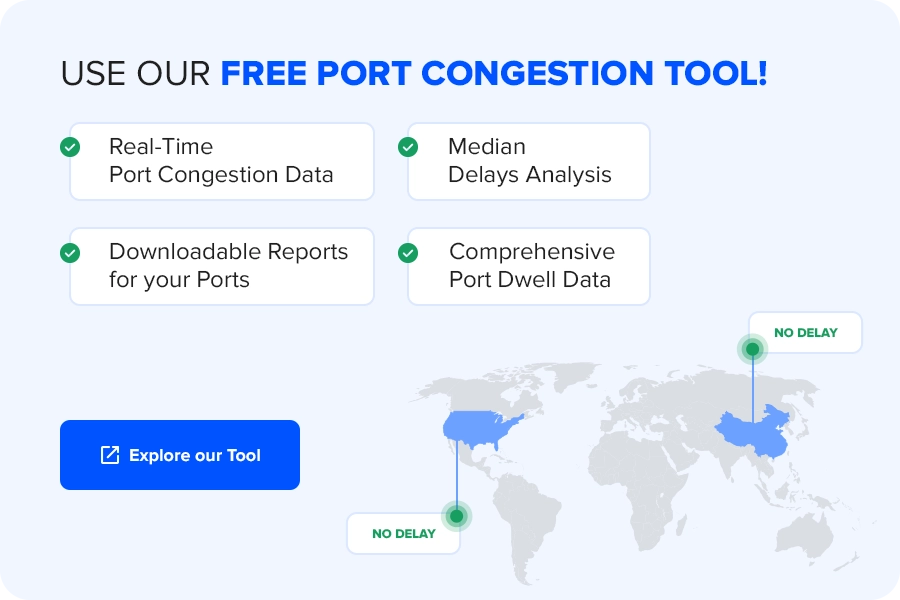Top 15 Biggest and Busiest Ports in the World in 2024
Ocean freight is the baseline for global trade with more than 90% of cargo movements happening via water ways. Major economies, corporate giants, and every facet in between rely on the bustling activity of shipping containers and, most significantly, the vital operations of ports worldwide. The ability of these ports to control the flow of commodities in and out of them, their role as final destinations, origins, or transhipment points, is crucial information for anyone looking to transport freight.
Using GoComet’s port congestion tracking software, we bring you a list of the top 15 busiest ports in the world!
1. Port of Shanghai, China
Since surpassing Singapore in 2010 to become the world’s busiest port, Shanghai has consistently shown an impressive growth pattern. With China’s massive economic power, it’s no wonder that Chinese ports dominate the global rankings. In fact, not only does China claim the top spot on this list, but more than half of these ports hail from China as well.
In 2019, the Port of Shanghai handled more than 43 million TEUs of containers, making it the busiest port in the world. The Port of Shanghai is a crucial entry point for China’s trade and commerce with the rest of the world. It is situated in the Yangtze River Delta, the center of China’s economic superpower.
The port has 200 berths and is outfitted with cutting-edge machinery and equipment to handle huge ships and cargo efficiently. The Port of Shanghai continues to gain significance as a center for international trade and commerce due to its advantageous location and sophisticated infrastructure.
The Shanghai Yangshan Deep Water Port, the largest automated container port in the world, is also a part of the Shanghai Port.
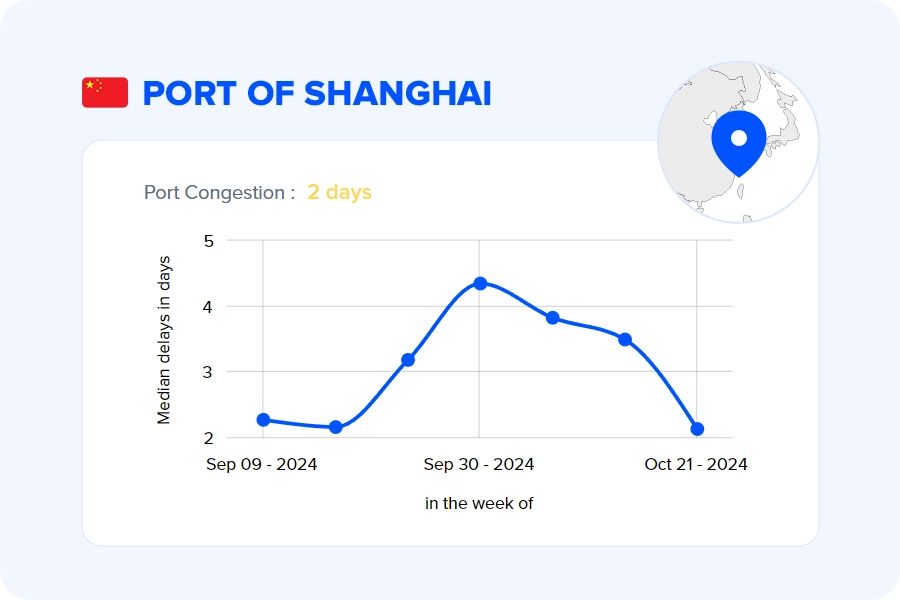
Congestion at Port of Shanghai- Analysis:
The Port of Shanghai continues to uphold its status as one of the busiest ports in China. According to quarterly port congestion data provided by GoComet, there were notable delay spikes, surpassing 35 days in December. This emphasizes the significant impact that holidays can have on the timely delivery of shipments. Despite this, the monthly median delay across the port generally ranged between 1-2 days.
Key info:
- UN/LOCODE: CNSHG
- Monthly throughput record: 4.20M TEU
- Total Annual Container Throughput: 43.5M TEU
- Vessels in port: 2290
- Annual cargo tonnage: 514 million
- Number of employees: 13546
- Major exports: Cars, Integrated Circuits, Computers, Telephones
- Major imports: Processors and Controllers, Iron Ore, Concentrate, Gold, Medium-sized cars
- Major trading partners: United States, Japan, Hong Kong, Taiwan, United Kingdom, Germany
2. Port of Singapore, Singapore
From 2005 until 2010, Singapore was the busiest port in the world before being surpassed by the Port of Shanghai. With 130,000 vessels calling at the port each year, the Port of Singapore now provides connectivity to over 600 ports in 123 countries across six continents. Additionally, it is the busiest transhipment port in the world, handling about 20% of all shipping containers.
The port, which connects Asia, Europe, and the Americas, is furnished with more than 200 berths and is strategically situated. The Port of Singapore is a centre for international trade and business, thanks to its cutting-edge logistics and transportation facilities and excellent container handling capability.
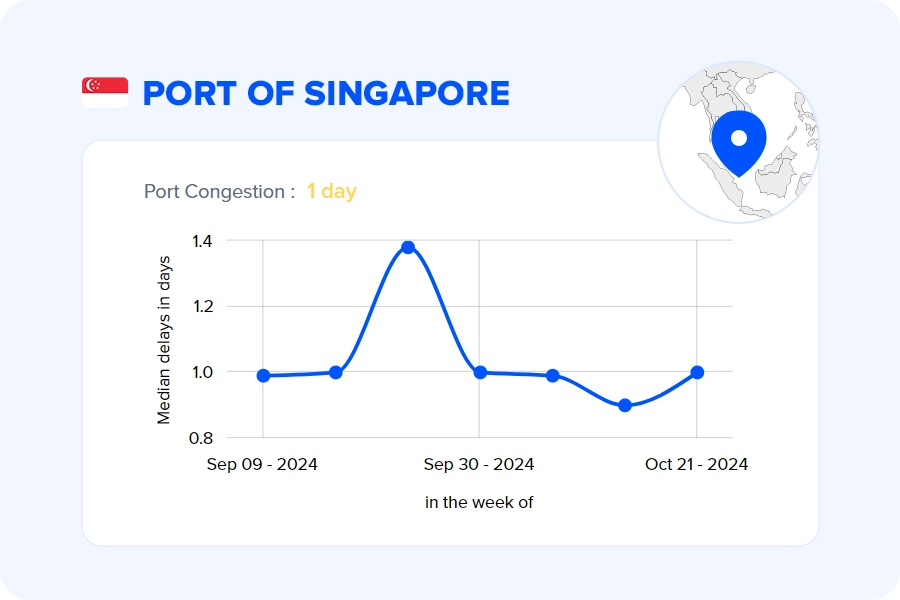
Congestion at Port of Singapore- Analysis:
As per our quarterly port congestion report, the Port of Singapore encountered a maximum shipment delay of 35 days in November. The obstruction caused by the Panama Canal blockage significantly contributed to shipments missing their deadlines. Throughout the quarter, the median delay consistently fluctuated within the range of 1 to 2 days.
Key Info:
- UN/LOCODE: SGSIN
- Annual TEU: 37.2 million TEUs
- Berths: 84
- Average vessel arrival annually: 140000
- Major imports: Electrical Machinery, Equipment, Mineral Fuels Including Oil, Machinery including computers, Gems, Precious Metal, Optical, Technical, and Medical Apparatus
- Major exports: Electrical Machinery, Petroleum, Chemical Products, Miscellaneous manufactured articles, Oil bunkers
- Major Trade partners: China, United States, Indonesia, Malaysia, Japan
3. Port of Shenzhen, China

The Port of Shenzhen is the second-largest port in China and the third-largest port in the world. Several ports in the area, including Yantian, Chiwan, Dachan Bay, and Shekou, are referred to collectively by this name.
Many tech companies, including Huawei, Tencent, and SenseTime, have set up shop there due to technical advancements in the region. Shenzhen, sometimes known as China’s Silicon Valley, is currently a major worldwide technological centre.
The Port of Shenzhen has seen a growth in commerce and container movement due to the city’s industrial activity and investments. As a result of this constant rise, the port overtook the neighbouring Port of Hong Kong to claim third place in 2013.
Key Info:
- UN/LOCODE: CNSZX
- Container traffic in 2018: 27.7 million TEU
- Cargo tonnage in 2018: 194.9 million tons
- It stretches along 260 Km of coast
- 130 container lines
- Number of employees: 12454
- Total foreign trade, including Imports: 3.45 Trillion Yuan
- Three main ports: Yantian Port, Nanshan Port and Dachan Bay Port
- Major exports: Mechanical and Electronic products, Computers, Data processing Devices, Spare parts, Mobile phones, Audio and Video equipment
Free Download: Port Congestion Analysis Report

4. Port of Ningbo-Zhoushan, China
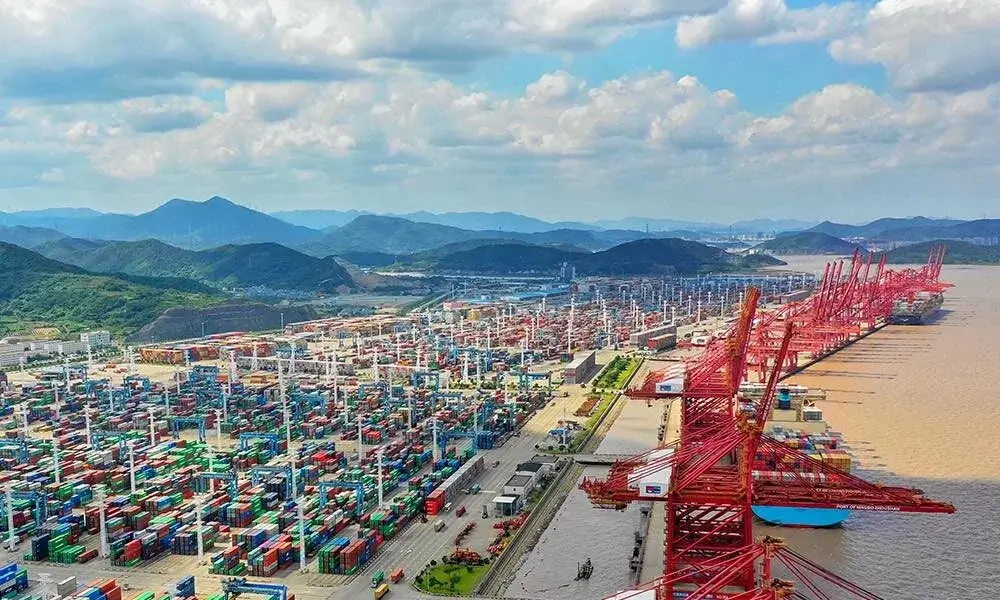
The ports of Ningbo and Zhoushan, once two distinct organizations, united in 2006 to form the Port of Ningbo-Zhoushan, the fourth-largest port in the world.
The Port of Ningbo-Zhoushan is an important entry point for regional trade and business. It is strategically situated at the Yangtze River’s entrance on China’s eastern coast.
The port has more than 400 berths and is renowned for its cutting-edge infrastructure, including advanced terminal equipment and container storage rooms.
Key Info:
- UN/LOCODE: CNNBG
- Container traffic in 2018: 26.4 million TEU
- Cargo tonnage in 2018: 1.12 billion tons
- Container throughput in 2019: 27.535 million TEU
- Number of employees: 17425
- Top Trading partners: European Union, United States, ASEAN
- The total worth of assets: 124.1 Billion
- Total Value of Import and Exports at the port: $270.77 Billion
- Largest Import: Crude Oil worth 153.48 Billion Yuan
5. Port of Guangzhou, China
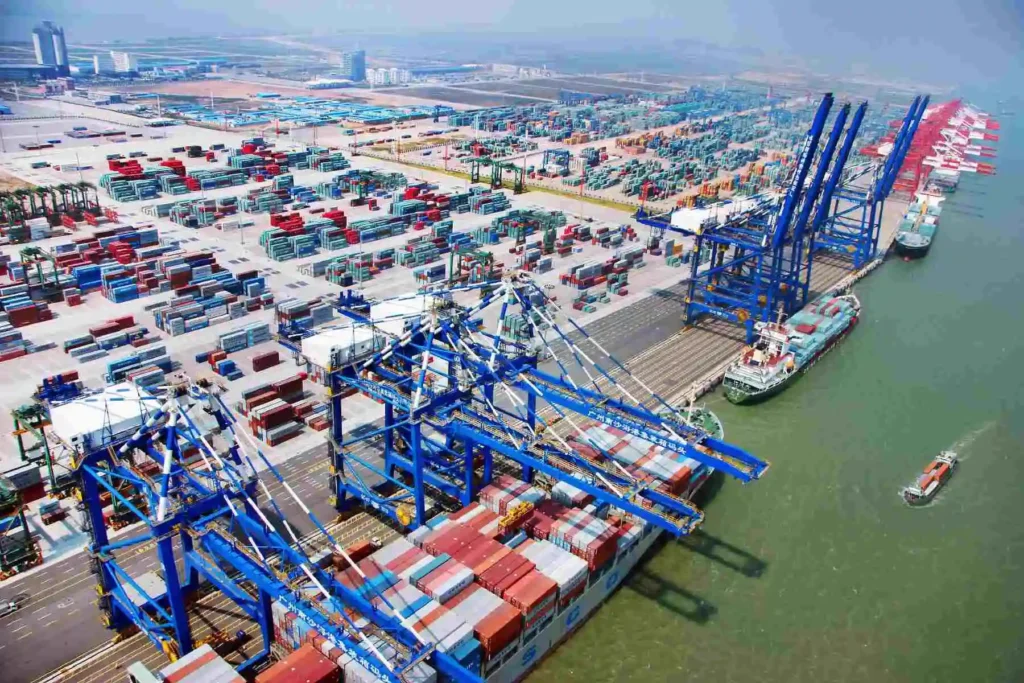
The Port of Guangzhou, situated in the southern province of Guangdong, serves as a crucial entry point for trade and business in south China.
The Port of Guangzhou became the fifth busiest port in the world after it handled a record-breaking number of 21.87 million TEUs in 2018. This was a 7.4% increase from what was handled by the port in 2017.
Key Info:
- UN/LOCODE: CNGZG
- Container traffic: 24.2 million TEU
- Cargo tonnage: 600 million tons
- Minimum wage: US$300
- GDP growth rate: 8.3%
- Number of terminals: 8
- Major exports: Tea, Silk, Paper, Copper, Iron, Gold and Silver
- Major trading partners: U.S, Japan, South Korea, Hong Kong, Taiwan and Thailand
6. Port of Busan, South Korea

Stepping away from China, we find South Korea’s Port of Busan is the sixth busiest port in the world. Situated on South Korea’s southeast coast, it is a significant entry point for trade and commerce in the area, linking South Korea to other nations in Asia and beyond. The port of Busan is also the world’s third-largest transhipment port.
The port of Busan handled 11.46 million TEUs in transshipments in 2018, which was an 11.5 per cent increase from the year before.
Key Info:
- UN/LOCODE: KRPUS
- Vessels in Port: 499
- Expected Arrivals: 273
- Container throughput: 22.7 million TEU
- Major exports: Circuits, Cars, Refined Petroleum, Passengers and Cargo ships, Vehicle parts
- Major Imports: Electrical equipment, Mineral Fuels, Oils, Distillation products, Machinery, Nuclear Reactor, Boilers, optical, Medical apparatus, Vehicle, Iron ores and ash
- Major trade partners: United Kingdom, United States, Japan, Netherlands, USA, China
7. Port of Hong Kong, China

Just like the ports of Singapore and Busan, the Port of Hong Kong is also a critical transhipment port.
The Port of Hong Kong was one of the most influential ports in southern China in the 1900s. But given the rising prominence of China in global economic trade in the past couple of decades, the pot of Hong Kong has slipped a few places in the ranking.
Key Info:
- UN/LOCODE: HKHKG
- Container traffic in 2018: 19.6 million
- Cargo tonnage in 2018: 258.5 million tons
- Land area: 279 hectares
- Available berths: 24
- Main export: Cermets, Blank audio Media, Oscilloscopes, Metalworking Transfer Machines
- Major imports: equipment, manufactured goods and articles, chemical, mineral fuels
- Major trading partners: Taiwan, USA, Singapore, Korea, Japan, Vietnam, India
8. Port of Qingdao, China
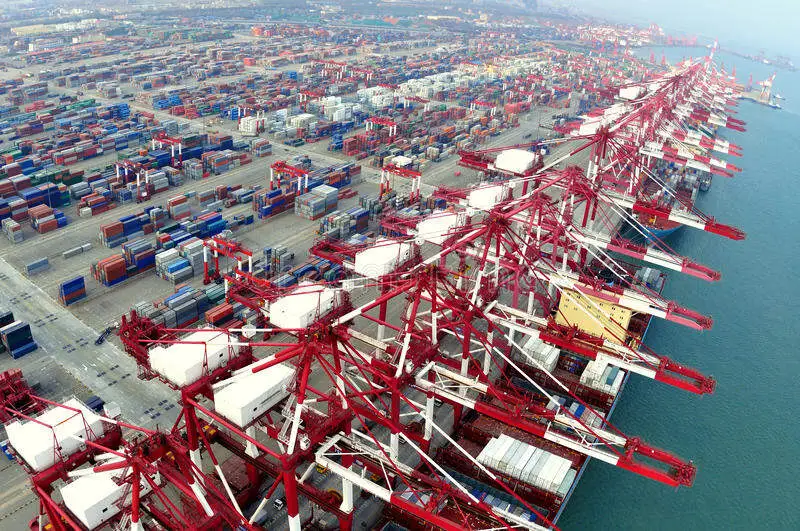
Established in 1892, China’s Port of Qingdao comprises four port areas: Dagang, Qianwan, Guangdong, and Dongjiakou. It is considered one of the most important ports for the West Pacific trade.
Key Info:
- UN/LOCODE: CNQDG
- Container traffic in 2018: 18.26 million TEU
- Cargo tonnage in 2018: 600 million tons
- Tied up with Busan Port, South Korea
- Number of Employees: 9,218
- Major cargo handled: Grains, steel Products, Fertilizers, Finish Product Oil, Alumina, Frozen Products
- Major trade partners: ASEAN, United States, EU
9. Port of Tianjin, China

Considered the maritime gateway to the Chinese capital, the Port of Tianjin is just 150km from Beijing. The Port of Tianjin comprises five main areas: Beijing, Haihe, Nanjiang, Beigang, and Dongjiang.
Key Info:
- UN/LOCODE: CNTXG
- Container traffic in 2018: 15.97 million TEU
- Cargo tonnage in 2018: 428.7 million tons
- Ranked 4th in terms of cargo traffic
- Ranked 9th in terms of container traffic
- Major imports: Fixed-wing aircraft, Unladen weight, Soya beans, Electronic Integrated circuits, Iron ore, Medium-sized cars
- Major exports: telephone sets, processors and controllers, bicycles, cargo containers
- Major trade partners: United States, Hong Kong, Japan, South Korea, Vietnam
10. Port of Jebel Ali, UAE

The port of Jebel Ali was opened in 1979 and has since been a prominent port in the global maritime industry. The port is not only the busiest and largest in the Middle-east region, but it is also known for being the world’s biggest man-made harbour.
Key Info:
- UN/LOCODE: AEJEA
- Annual Container Volume: 13.6 million TEUs
- Berths: 67
- Number of Terminals: 3
- Vessels in port: 85
- Expected Arrivals: 71
- Berths: 67
- Major Exports: Crude petroleum, Gold, Refined Petroleum, Broadcasting equipment, Diamonds
- Major Imports: Gold, Broadcasting equipment, Cars Diamonds
- Major trade partners: China, India, United States, Saudi Arabia, Germany
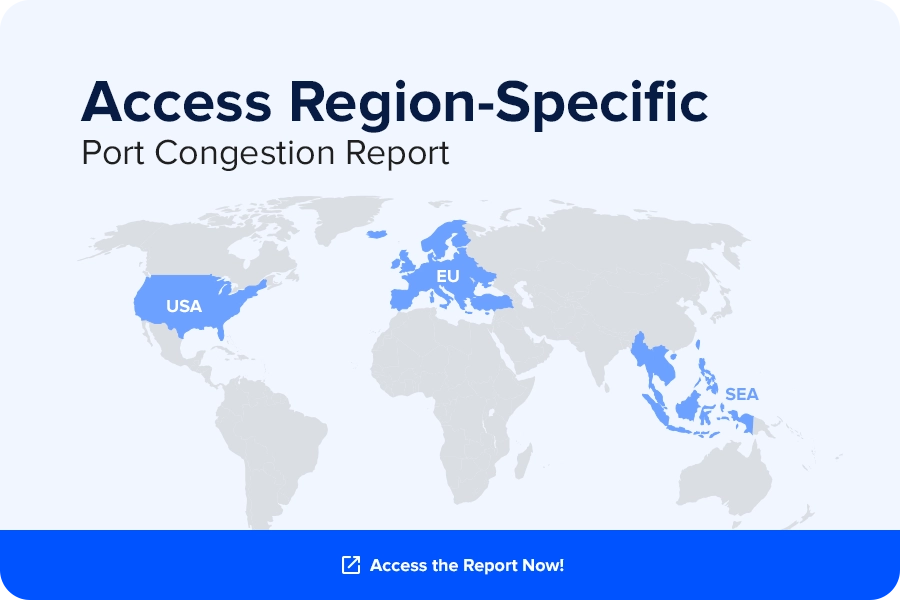
11. Port of Rotterdam, Netherlands

The Port of Rotterdam in the Netherlands was a prominent port that dominated world trade between the mid-20th and the early 21st century. In fact, it was the top port for over four decades, from 1962 to 2004. The port is one of Europe’s top ports, significantly impacting the trade and economy in and around the region.
Key Info:
- UN/LOCODE: NL RTM
- Annual Cargo Tonnage: 468.7 million tons
- Annual Container Volume: 15.3 million TEUs
- Annual Revenue: 772.7 million Euro
- Employees: 1270
- Vessel arrivals 28876
- Major Imports: Fuel, Machinery, Food and live animals, Pharmaceuticals and electronics
- Major Exports: Refined Petroleum, Broadcasting equipment, Packaged Medicaments, Computer, Photo Lab Equipment
- Major trade partners: Germany, Belgium, France, United Kingdom, United States
12. Port Klang, Malaysia

Known as Southeast Asia’s largest port, Port Klang in Malaysia, is 38 kilometres away from its capital city of Kuala Lumpur. The port was known as Port Swettenham under British rule and was later renamed Port Kelang in 1972.
Port Klang is located at the crossroads of shipping routes connecting Asia, Europe, and the Middle East, making it a key regional transhipment hub.
Key Info:
- UN/LOCODE: MYPKG
- Annual Container Throughput: 13.7 Million TEUs
- Cargo Tonnage: 220 million
- Berth: 53
- Major Exports: Timber, Automobiles, Liquid bulk such as Latex, palm and coconut oil, petroleum goods
- Major Imports: Steel coils, Rods, Wires, Billets, Fruit, Grains, Machines equipment
13. Port of Antwerp, Belgium
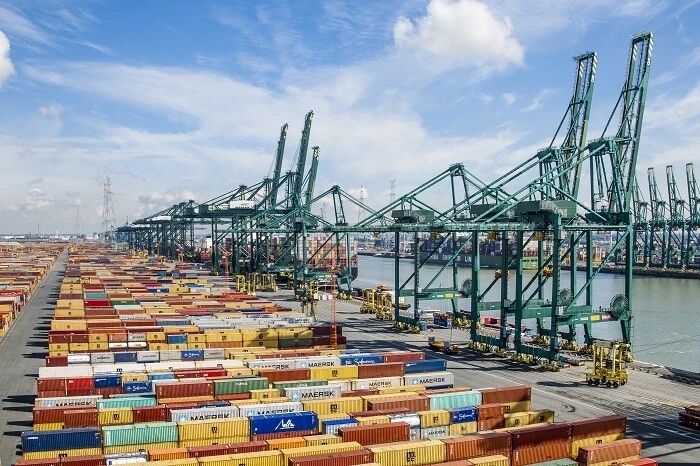
Belgium’s Port of Antwerp is the second busiest port in Europe and is in 13th position in the world. The port of Antwerp has become one of Europe’s largest seaports, ranking second behind Rotterdam by total freight shipped.
The Antwerp port is renowned for its efficient handling of a wide range of cargo, including container ships, dry bulk carriers and oil tankers. The port handles over 200 million tons of cargo annually and is a major hub for container traffic, with a handling capacity of over 14 million TEUs.
Key Info:
- UN/LOCODE: BEANR
- Annual Cargo tonnage: 240 million tons
- Vessel arrivals: 14220
- Major imports: Machinery and equipment, chemical, diamonds, pharmaceuticals, foodstuffs, transportation, oil products
- Major Exports: Cars, Packaged Medicaments, Vaccines, Blood, Antisera, Toxins, Refined Petroleum, Diamonds
- Major trade partners: Germany, Netherlands, France, UK, United States, China
14. Port of Kaohsiung, Taiwan
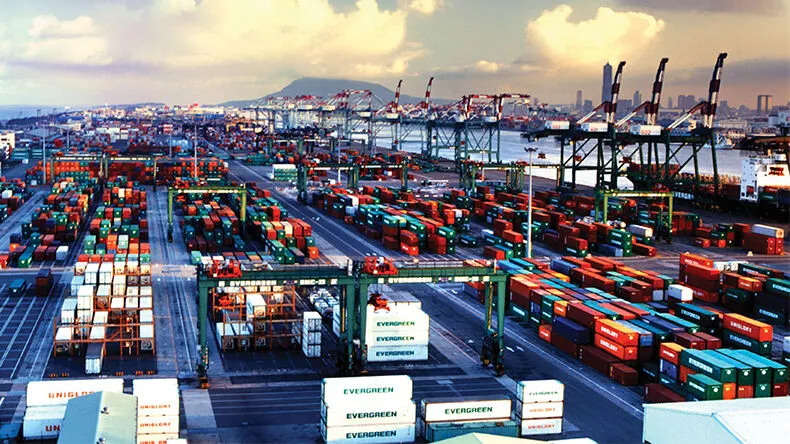
Kaohsiung Port is an important port in Taiwan located on the southwestern coastline. It is one of the largest container-handling facilities in the world. With its strategic location in the nation’s industrial region, the port handles 18.9 million tonnes of cargo and 9.8 million TEU annually and is visited by over 5000 vessels.
The port is a crucial contributor to Taiwan’s economy as a Logistics hub, transhipment centre of the Asia-Pacific region, and important fishing port. The port is run by the Kaohsiung Harbour Bureau and equipped with state-of-the-art technology for optimal efficiency.
Key Info:
- UN/LOCODE: TWKHH
- Annual Container Volume: 10.27 million TEUs
- Berths: 25 special-use berths
- Vessels: 5000+
- Warehouses: 70
- Cargo capacity: 100000
- Major Exports: electronics, basic metals, metal products, plastics and rubber, chemical and machinery
- Major Imports: Machinery, chemicals, plastics, rubber, leather goods, and miscellaneous manufactured items
- Major Trade Partners: Germany, South Africa, Brazil, Saudi Arabia, Japan
15. Port of Los Angeles, United States
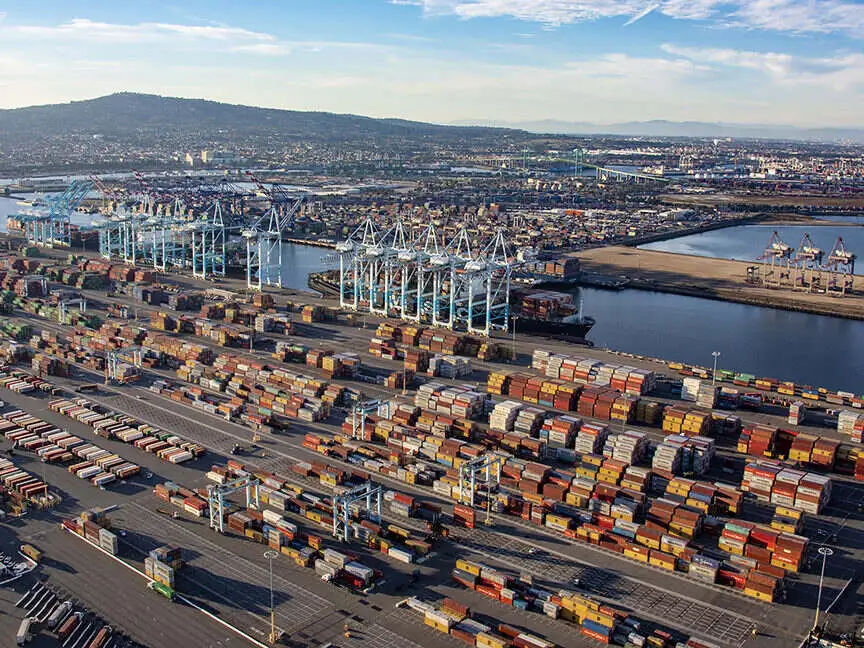
The Port of Los Angeles in California, also called America’s port, is the first US port to appear in the Top Busiest Ports in the World list. The port is located in San Pedro Bay in Southern California and is the busiest in the United States. It is a central hub for international trade, handling over 9 million TEUs of container cargo annually and serving as a gateway for goods from Asia, Europe, and South America.
With its strong commitment to environmental sustainability, the Port of Los Angeles is a leader in the development of clean transportation solutions, including electric and hybrid vehicles, and is dedicated to reducing the impact of its operations on the local community and the environment.
Key Info:
- UN/LOCODE: USLAX
- Vessel Arrivals: 1867
- Annual Cargo Tonnage: 178 million tons
- Annual Container Volume: 9.3 million TEUs
- Value of cargo: 276 billion USD
- Major Imports: Computers, Cars, Telephones, Crude Petroleum, Integrated Circuits
- Major Exports: Cotton, Bovine Cuts boneless, Frozen, Food preparations, Nuts, ferrous waste or scrap
- Major Trade Partners: China, Japan, Vietnam, Taiwan
Looking for a smoother, more transparent shipping process with full visibility over your cargo? Schedule a free demo of GoComet’s solution to see how it offers 100% multi-modal supply chain visibility and helps you achieve double-digit cost savings. Say goodbye to inefficiencies and manual processes with an automated system that eliminates your current pain points and streamlines operations. Experience the power of GoComet and take control of your supply chain today!
